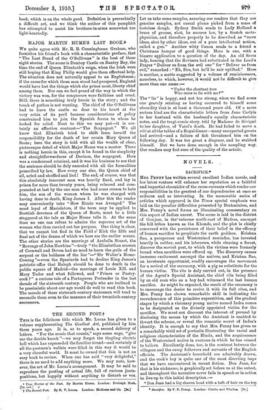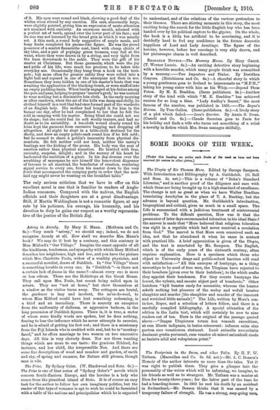NOVELS.
SACRIFICE.*
NES. PENNY has written several excellent Indian novels, and her latest venture will enhance her reputation as a faithful and impartial chronicler of the cross-currents which render our responsibilities in the greatest of our dependencies at once so arduous and so interesting. In the memorable series of articles which appeared in the Times special emphasis was laid on the peculiar difficulties presented by Brahminism, and Mrs. Penny's Dover forms an illuminating commentary on this aspect of Indian unrest. The scene is laid in the district of Ganjam, in the-extreme north-east of Madras, amongst the hill tribes known as the Khonds, and the plot Is chiefly
• concerned with the persistence of their belief in the efficacy of human sacrifice to propitiate the earth goddess. Krishna Sao, a prosperous and Westernised zemindar, has invested heavily in rubber, and his labourers, while clearing a forest, discover the meriah post, to which the victims were formerly bound when sacrifices were offered up. The discovery causes immense excitement amongst the natives, and Krishna Sao, an inveterate opportunist, readily encourages the movement for a revival of the ceremony, With a pig as substitute for the human victim. The rite is duly carried out, in the presence of the Agent's Special Assistant, the chief role being filled by an old man who as a boy had witnessed the last human sacrifice. As might be expected, the result of the ceremony is to encourage the desire to revive it with its full rites, and Mrs. Penny has shown remarkable skill in indicating the recrudescence of this primitive superstition, and the gradual stages by which a visionary young native named Indra comes • to be designated as the divinely appointed victim for the sacrifice. We must not discount the interest of perusal by disclosing the means by which the Assistant is enabled to thwart the scheme, or reveal the romantic secret of Indra's identity. It is enough to say that Mrs. Penny has given us a remarkably vivid set of portraits illustrating the racial and • religious characteristics of the Hindu, and the acquiescence of the Westernised native in customs in which he has ceased to believe. Excellently done, too, is the contrast between the villagers and the camp followers and servants of the English officials. The Assistant's household are admirably drawn, and the cook's boy is quite one of the most diverting imps that we have encountered in recent fiction. Don Juan, for that is his nickname, is graphically set before us at the outset, and throughout the narrative never fails in speech or in action to live up to this initial description Don Juan had a big shaven head with a tuft of hair on the top • Sacrifice. By P. E. Pony.- London; Chatto and Windt's. [Gs.]
offt. His eyes were round and black, showing a good deal of the whites when stirred by any emotion. His ears, abnormally large, were slightly pointed, giving him an expression of acute attention not unmixed with curiosity. An enormous mouth, adorned with a perfect set of teeth, spread over the lower part of his face ; and its size was not lessened by the broad grin in which it was usually set. A thin neck, a round body suggestive of ample meals, and bony limbs completed his gnome-like figure. He was the proud possessor of a scarlet flannelette coat, lined with cheap chintz of sky-blue, and a pair of popinjay green trousers, very full at the waist, where they were drawn in by a string, and very tight from the knee downwards to the ankle. They were the gift of his master at Christmas. But these garments, which were the joy and pride of his life, were much too precious to be taken into everyday use. Occasionally,they hung from a hook on the tent- pole ; but more often for greater safety they were rolled into a tight ball and reposed in one of the saucepans not then in use. Sometimes they were hidden in one of his n3aster's-boots that was awaiting the application of the blacking-brush, or were. stuffed into an empty puddi a-basin. When busily engaged at his duties among the pots and pans, helping to prepare 'master's grub,' he was content to wear nothing but a diminutive loin cloth. In tho early morning or after sundown, when the air of the hills was damp and chilly, he clothed himself in a vest that had once formed part of the wardrobe of an English lady. His mother had bought it for him in the bazaar one day, after he had complained to her that he felt the cold in camping with his master. Being blind she could not see its shape; but she could feel its soft woolly texture, and had no doubt as to its suitability. A tea-cloth- wound closely round his loins kept the garment from excessive bagging and dropping off altogether. At night he slept in a table-cloth destined for the clhoby, and drew an empty potato-sack round him if he felt cold ; but he seemed to share a goblin's immunity from physical dis- comforts. He felt neither cold nor heat, neither the matey's beatings nor the kicking of the peoas. His body was the seat of emotion rather than physical sensation. Ho bristled with fear, curiosity, surprise, delight; and in the secrecy of his heart he harboured the ambition of a giant. In his day-dreams over the scrubbing of saucepans he saw himself the benevolent dispenser of favours to all mankiad, the benefacter of creation, rendering signal service to every one, from his master down to the very fowls that accompanied the camping party in order that tho new- laid egg might never be wanting on the breakfast table."
The only serious criticism that we have to offer on this excellent novel is one that is familiar to readers of Anglo- Indian romances. Compared with the natives, the English officials and their daughters are at a great disadvantage. Still, if Martin Waldingham is not a romantic figure, at any rate by his patience, his courage, his humanity, and his devotion to duty he gains our respect as a worthy representa- tive of the justice of the British .114.











































































 Previous page
Previous page